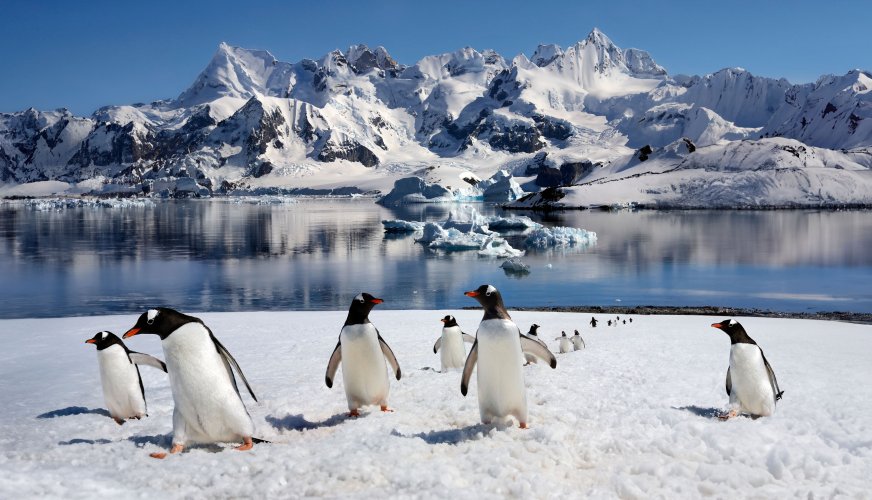The National Antarctic Science Center (NASC) is at the center of a high-profile scandal over a post by propaganda blogger Anatoly Sharii about an alleged 10-fold increase in spending on Antarctic research. After a strong reaction from fellow citizens on social media, the National Academy of Sciences published a post on its Facebook page with a detailed explanation of the sources of funding for the Center and why its research is important.
The "betrayal" around the National Antarctic Science Center and the funding of the Akademik Vernadsky station began on May 26 with a post on Telegram by pro-Russian blogger Anatoliy Shariy. He wrote that about $23 million has been allocated from the state budget of Ukraine for the Akademik Vernadsky station over the past 2 years, and the costs for 2023 and 2024 are 10 times higher than the funding in 2022.

The post was picked up in some Telegram channels and several media and wrote that the scientific program should be curtailed for the duration of the war, and the money should be transferred to drones instead of penguins.
Ukrainians in social networks were also outraged by the sums that will allegedly go "to study penguins".




And the Ukrainian memesphere was replenished with such creations:


After a wave of hate and indignation, the National Antarctic Science Center provided a detailed explanation for Ukrainians, why funding for Antarctic research is so important for our country and the world, and from what sources it is received.
Scientists said that funds for Antarctic research cannot be spent on drones and any other military needs . This is because the program of polar explorers is financed from the part of the state budget that is provided purely for humanitarian expenses. It is filled at the expense of international partners – with the condition that the money will be spent only on civilian needs.
"That is, this money cannot be used for the purchase of drones, ammunition, soldiers' salaries or any other military needs," the National Center for Defense Research and Development said.
The polar explorers said that in addition to budget funds, the program is financed by international projects and cooperation. For example, the Polish Antarctic Program has been partially financing the expeditions of the scientific vessel "Noosphere" for the third year, and in the European Commission's "Horizon" programs, the National Center for Scientific Research has already won 3 projects at the funding competition, and 4 more are under consideration.
Because the scientists understand that the average citizen is not aware of the details of their daily research activities, they explained the importance of Antarctic research in an accessible way:
- "The main research at our station has always been geophysical and meteorological, and later biological ones were added. Some series of geophysical and meteorological observations at "Vernadsky" are the longest in the entire Antarctic: climate observations have been conducted daily since 1947, Earth's magnetic field since 1954, ozone level in the atmosphere since 1957. The task of our scientists is to collect, process and transfer this data to international and Ukrainian organizations. They are then used for a wide variety of needs – from navigation of ships and airplanes to the construction of climate models or ordinary weather forecasts."
- "We have already mentioned continuous observations – they are of great value for world science precisely because they are made constantly at the same time using the same methods, that is, they are available for comparison. Based on climate data from 1947, we now see that the average annual temperature in the Antarctic has increased by more than 3°C! And there are many such examples."
- "If the infrastructure of the station is not taken care of in the Antarctic and icebreakers are put in the "cold cesspool", the station will simply collapse and the ship will go to scrap metal. After the Victory, we will have to build all this from scratch, and this is incomparably (by orders of magnitude) greater expenses than the funds for program support. After the collapse of the USSR, Russia did not give us a single allied station. We received our current station for free from Great Britain, for which Ukrainian scientists and diplomats made enormous efforts at one time. After that, Ukraine made a lot of investments to be an Antarctic state. Stopping the Antarctic program will simply erase all of that."
- "Another important nuance is political. Ukraine is one of several dozen countries that have year-round stations in the Antarctic and the right to vote in the Antarctic Treaty (and all decisions there are made exclusively by consensus). That is, we have a real influence on the decision of the fate of the Antarctic, as well as a voice on an important international platform, which we actively use, in particular, to inform about Russian aggression and counter the activities of the Russian Federation. By the way, Russia has several stations in the Antarctic, finances them all, and modernizes some even during the "SVO" and will be very happy if Ukraine stops Antarctic research and participation in the Treaty," the National Center added.
Other scientists spoke in support of the polar explorers. This is what the Minister of Education and Science of Ukraine Oksen Lisovyi wrote on his Facebook page:
The famous biologist, participant of the 27th and 28th expedition to Antarctica, Serhiy Glotov, explained in a comment to LVIV.MEDIA that the existence of the "Akademik Vernadskyi" station is important for Ukraine, because it introduces our country to the number of 30 countries in the world that have their scientific research offices in Antarctica.
"Almost all global scientific projects are currently frozen in the Academy of Sciences. They are either closed or barely alive so that scientists do not die of hunger. The Antarctic program is our flagship project. It is very important, if we abandon our own Antarctic station now, we will never be able to build a new station again," the scientist believes.
He said that while a lot of scientific infrastructure is being destroyed in Ukraine, on the contrary, observatories, methods, and research are preserved in Antarctica. Most of them are joint projects of Ukraine with Great Britain, the USA, Spain, and the Czech Republic. They last for many years and investigate global climate changes, their impact on the state of ecosystems not only in Antarctica, but on the planet in general. This is one of the most modern research stations in Ukraine. The results of her research are analyzed in almost two dozen countries of the world.
As EcoPolitic wrote earlier, Antarctica is melting at an unpredictable rate and, according to scientists' forecasts, by the year 2100 will be covered with flowers.





